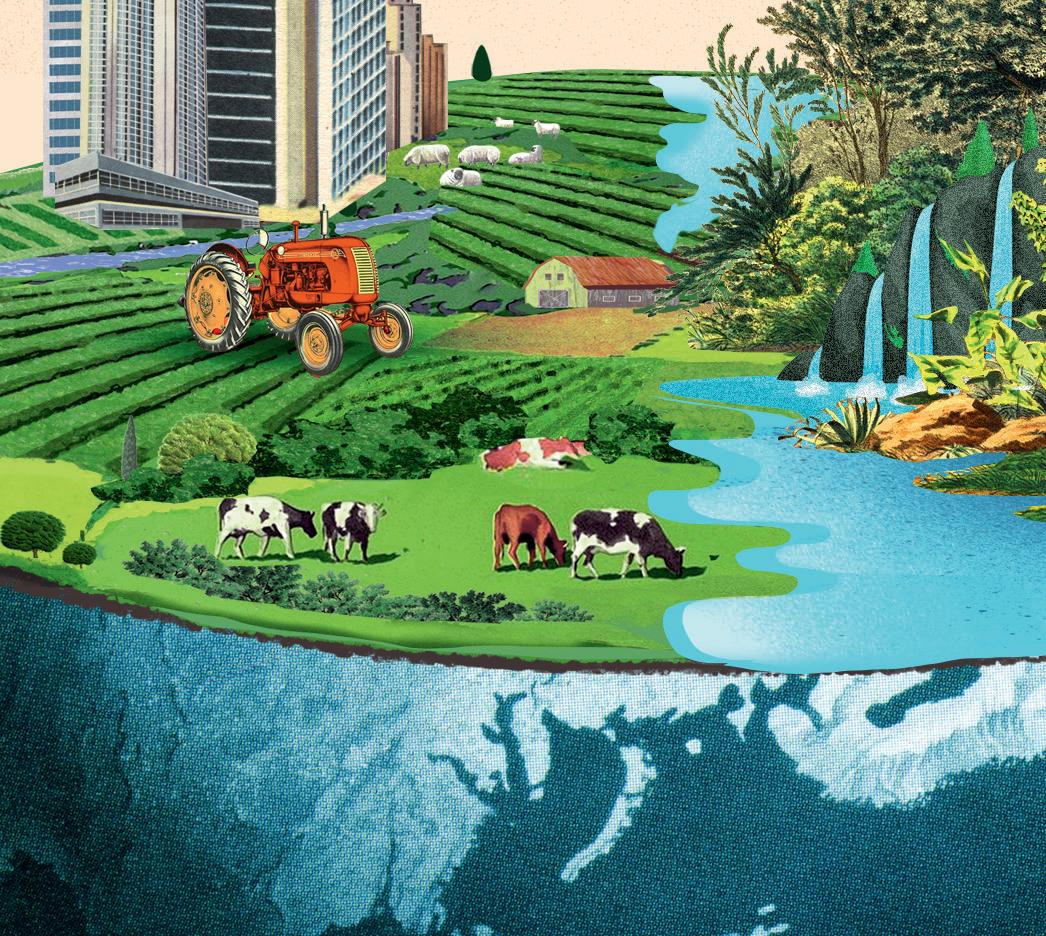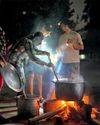
The story of the biodiversity crisis starts with a cold-case murder mystery that is tens of thousands of years old. When humans started spreading across the globe they discovered a world full of huge, mythical-sounding mammals called "megafauna", but by the end of the Pleistocene, one by one, these large animals had disappeared. There is no smoking gun and evidence from ancient crime scenes is - unsurprisingly patchy. But what investigators have learned suggests a prime suspect: humans.
Take the case of Genyornis, one of the world's heaviest birds, which was more than 2 metres tall and weighed in excess of 200kg. It lived in Australia until, along with many other megafauna, it went extinct 50,000 years ago. In North America, giant beavers weighing the same as a fridge and an armadillo-like creature called a glyptodon, which was the size of a small car, existed until about 12,000 years ago, when they, too, went extinct. In all, more than 178 species of the world's largest mammals are estimated to have been driven to extinction between 52,000 and 9,000BC.
These extinctions happened over hundreds or thousands of years, so it is unlikely people back then recognised it as a crisis. But, in some cases, the loss of these animals would have had landscape-scale impacts.
For a long time, the extinctions were thought to be linked to natural changes in the environment until palaeontologist Paul S Martin put forward his controversial "overkill hypothesis" in 1966. This stated that humans were responsible for the extinctions of megafauna, destroying the romantic vision of early humans living in harmony with nature.
By 10,000 years ago, when humans had spread across every continent except Antarctica, there were at most 10 million of them-so a lot of change had already been dished out by few people.
Diese Geschichte stammt aus der December 02, 2022-Ausgabe von The Guardian Weekly.
Starten Sie Ihre 7-tägige kostenlose Testversion von Magzter GOLD, um auf Tausende kuratierte Premium-Storys sowie über 8.000 Zeitschriften und Zeitungen zuzugreifen.
Bereits Abonnent ? Anmelden
Diese Geschichte stammt aus der December 02, 2022-Ausgabe von The Guardian Weekly.
Starten Sie Ihre 7-tägige kostenlose Testversion von Magzter GOLD, um auf Tausende kuratierte Premium-Storys sowie über 8.000 Zeitschriften und Zeitungen zuzugreifen.
Bereits Abonnent? Anmelden

Putin's Call To De-Dollarise Alarms Some At BRICS Talks
Vladimir Putin opened the expanded Brics summit last month by issuing a call for an alternative international payments system that could prevent the US using the dollar as a political weapon.

Power in the darkness
Wolf Hall is back. As the extraordinary epic about King Henry VIII and his vengeful entourage edges to a climax, Timothy Spall reveals what it was like to play Cromwell's nemesis

It's time for Trump's instincts to be called what they are: fascist
There is a good chance that on 5 November, Americans will elect the first fascist president of the United States.

CASTLES IN THE AIR
It was meant to be a dream development of mansions in the Turkish hills. But 13 years on, Burj AI Babas is a half-built ghost town, and a microcosm of the scandal-hit construction sector under Erdoğan. Will the buyers ever get to move in?

Using cutting-edge methods, Alexandra Morton-Hayward is unravelling the mysteries of grey matter – even as hers betrays her The brain collector
ALEXANDRA MORTON-HAYWARD, a 35-year-old mortician turned molecular palaeontologist, had been behind the wheel of her rented Vauxhall for five hours, motoring across three countries, when a torrential storm broke loose on the plains of Belgium.

Dark times Blackouts spark fears of wider collapse
Maria Elena Cárdenas is 76 and lives in a municipal shelter on Amargura Street in Havana's colonial old town.

Washington Post sparks fury over decision not to endorse
Fury and shock ripped through liberal America last weekend after news that the Washington Post, home of the Watergate scandal exposé, will not endorse Kamala Harris for president.

The great space waste
From chaotic collisions to depletion of the ozone layer, the thousands of satellites in orbit around Earth have the potential to wreak havoc

New heights Teen Sherpa's fight for climbing equality
Growing up as a sherpa in Nepal, Nima Rinji Sherpa was used to his relatives performing superhuman feats on the mountains.

Plastic cave made in Spain keeps Amazonian culture alive
It is not yet dawn in Ulupuwene, an Indigenous village in the Brazilian Amazon, but the Wauja people have already risen to prepare for the festive day ahead.